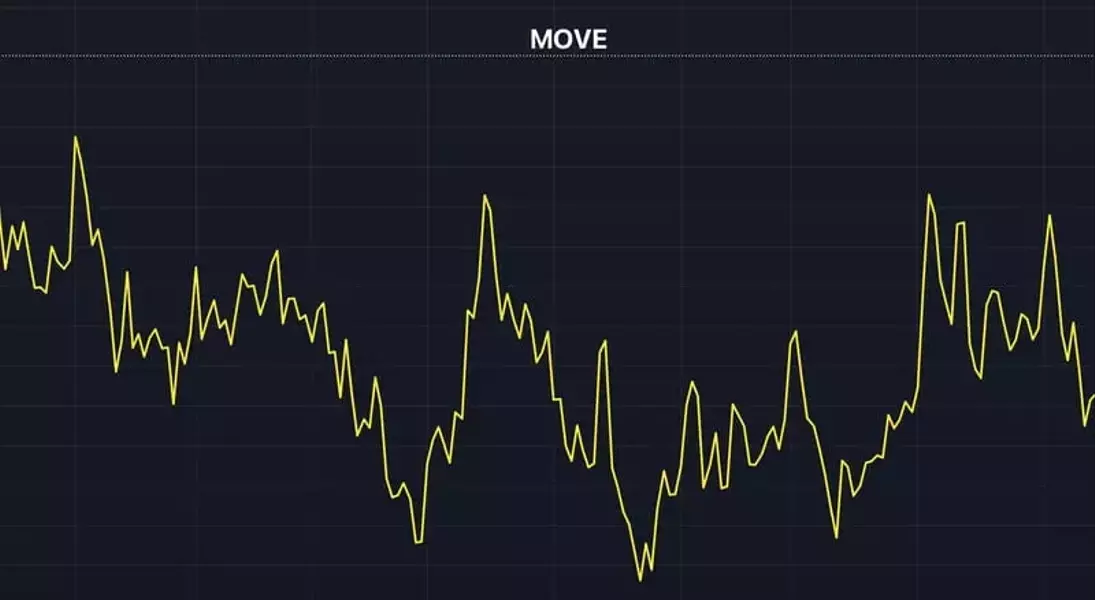The upcoming U.S. presidential election has sparked a surge in volatility across various financial markets, including cryptocurrencies, foreign exchange, and U.S. Treasury notes. This heightened uncertainty is reflected in options-based measures of expected price swings, indicating that investors are pricing in a significant risk premium around the election outcome.
Navigating the Turbulent Landscape: Insights into Market Volatility
Crypto Volatility Reaches Three-Month High
The options-based measure of expected price swings in bitcoin, a closely watched gauge known as the Deribit bitcoin implied volatility index (DVOL), has reached its highest level since late July. This surge in volatility suggests that investors are bracing for significant price fluctuations in the cryptocurrency market, likely driven by the uncertainty surrounding the U.S. election.Interestingly, the seven-day implied volatility for bitcoin, which captures the upcoming Federal Reserve meeting and the expected election results, has jumped to an annualized 74.4%. This figure is significantly higher than the seven-day realized or historical volatility of 41.4%, indicating that the market is pricing in a substantial risk premium around the elections.Volatility Spikes in Legacy Markets
The volatility surge is not limited to the cryptocurrency market; it has also been observed in traditional financial markets. The Ice BofA Move index, a measure of 30-day implied volatility in U.S. Treasury notes, has jumped to 135%, the highest level since October 2023.This increased volatility in the U.S. Treasury market, which plays a significant role in global leveraged financing, can lead to liquidity tightening and often prompts traders to trim their exposure to risk assets, including cryptocurrencies.Furthermore, the one-week implied volatility in the EUR/USD currency pair, the most liquid pair in the foreign exchange market, has risen to its highest level since the mini-U.S. banking crisis of March 2023.Betting Markets Reflect Tight Race
The surge in volatility across various asset classes appears to be driven by the perceived tightness of the upcoming U.S. presidential election. Early Sunday, the probability of the pro-crypto Republican candidate, Donald Trump, winning the critical swing state of Pennsylvania weakened sharply from 61% to 53% on the decentralized predictions platform Polymarket.Additionally, a New York Times/Siena poll of likely voters released early Sunday showed Trump and his Democratic opponent, Kamala Harris, tied at 48%, with Harris leading by two points in a Marist survey that includes undecided voters. In U.S. politics, a swing state is any state that a Democrat or Republican candidate could reasonably win, and the outcome in these states often determines the overall election result.Market Reactions and Implications
The volatility surge has had a tangible impact on the cryptocurrency market. Bitcoin, for instance, almost hit record highs earlier this week, rising to $73,500 on Tuesday as betting platforms pointed to a comfortable Trump lead. However, since then, Trump's odds and bitcoin's price have retreated, with the latter falling below $68,000 early today.This volatility in the cryptocurrency market, coupled with the increased turbulence in the foreign exchange and U.S. Treasury markets, underscores the heightened uncertainty surrounding the upcoming U.S. elections. Investors and traders are closely monitoring the situation, as the outcome of the election could have significant implications for various asset classes, including cryptocurrencies.As the election draws near, market participants will continue to navigate this turbulent landscape, adjusting their strategies and risk management practices to adapt to the evolving market conditions. The ability to navigate this uncertainty will be crucial for investors and traders seeking to capitalize on the opportunities and mitigate the risks presented by the upcoming U.S. presidential election.
